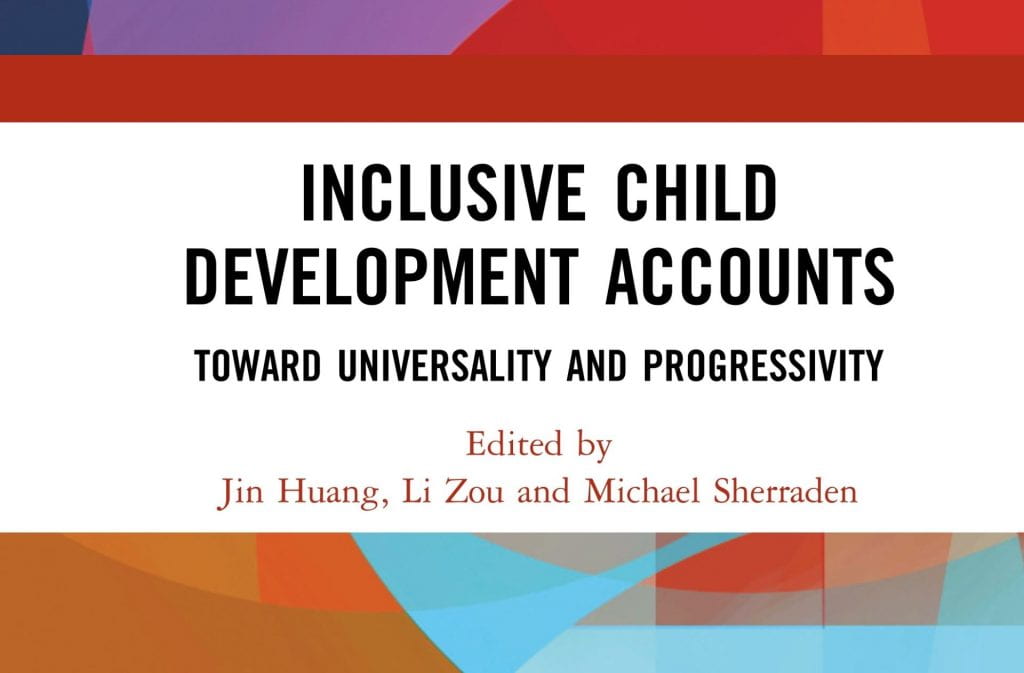Nearly 30 years after the publication of Michael Sherraden’s seminal Assets and the Poor, Child Development Account (CDA) policies and programs are emerging across the globe. “Many countries are exploring new policy innovations that encourage asset building,” said Sherraden.
Now, a new book edited by Jin Huang, Li Zou and Sherraden—Inclusive Child Development Accounts: Toward Universality and Progressivity—showcases the global context of those advancements. Over seven chapters, the book examines CDA policies and programs in Singapore, Israel, the United States, Taiwan, Uganda, Korea and mainland China.

By interweaving examples from such a diverse set of countries around the world, the book explores how asset building can be effective in various cultural and social contexts. “Despite such differences, the long-term vision for CDAs across the globe remains consistent: to support the growth and development of all children to ensure their greatest potential,” write the editors in the introduction.
Organized into two parts, the chapters detail inclusive CDA policies (Part I) and CDA programs and projects (Part II). Each chapter offers lessons that may pave the way for future CDA policy development.
For instance, building CDA policies on existing policy systems—such as state 529 college savings plans in the U.S. (Chapter 3) and the Child Allowance program in Israel (Chapter 2)—can be an efficient strategy. Substantial CDA policies for children in Singapore are part of that country’s extensive and lifelong asset-building strategy (Chapter 1).
In addition, other benefits can be built into CDA interventions, such as mentorship and financial planning in Uganda (Chapter 6) and training for parents of children with developmental disability in China (Chapter 8). CDAs are a natural fit with existing education, job training and health policies.
The book explores emerging CDA policies and programs from country to country, but the editors write, “a more ambitious (yet possible) vision is that innovations in CDAs may lead someday to an asset-building account for every child on the planet.”
Inside the book
Introduction: “Toward universal, progressive, and lifelong asset building: Introduction to the special issue on inclusive child development accounts,” by Michael Sherraden, Jin Huang and Li Zou
Part I: Inclusive Child Development Account Policies
- “Building assets from birth: Singapore’s policies,” by Vernon Loke and Michael Sherraden
- “The Saving for Every Child Program in Israel: An overview of a universal asset-building policy,” by Michal Grinstein-Weiss, Olga Kondratjeva, Stephen P. Roll, Ofir Pinto and Daniel Gottlieb
- “Impacts of child development accounts on parenting practices,” by Jin Huang, Yunju Nam, Michael Sherraden and Margaret Clancy
Part II: Child Development Account Programs and Projects
- “Policy innovation and policy realisation: The example of Children Future Education and Development Accounts in Taiwan,” by Li-Chen Cheng
- “Assessing the impact of an asset-based intervention on educational outcomes of orphaned children and adolescents: Findings from a randomised experiment in Uganda,” by Proscovia Nabunya, Phionah Namatovu, Christopher Damulira, Apollo Kivumbi, William Byansi, Miriam Mukasa, Jennifer Nattabi and Fred M. Ssewamala
- “A qualitative study on participants’ perceptions of Child Development Accounts in Korea,” by Han Chang-Keun
- “Breaking the cycle: An asset-based family intervention for poverty alleviation in China,” by Suo Deng
Conclusion: “Policy models for child development accounts: vision, potential, strategies,” by Jin Huang, Michael Sherraden and Li Zou.
